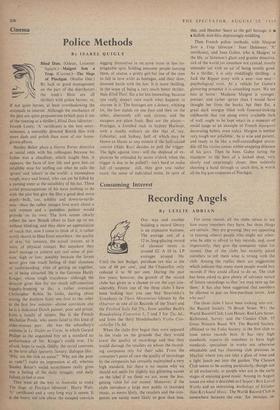Cinema
Police Methods
By ISABEL QUIGLY
Blind Date. (Odeon, Leicester Square.)—Maigret Sets a Trap. (Curzon.)—The Siege of Pinchgut. (Studio One.) BY luck or good management on the part of the distributors the week's films are all thrillers with police heroes; or, if not quite heroes, at least overshadowing the criminals in interest. Although the mechanics of the plot are quite preposterous (which puts it out of the running as a thriller), Blind Date (director : Joseph Losey; 'A' certificate) is the best enter- tainment, a smoothly directed British film with more dash and polish than most of our home- grown efforts. • Stanley Baker plays a Jimmy Porter detective at social odds with his colleagues because his father was a chauffeur, which taught him, it appears, the facts of low life and gave him an infallible nose for sniffing out what he calls the 'givers' and 'takers' in the world: a tremendous tough, wary and brutal, who can yet be felled by a passing sneer at the suitability of his hat. These social preoccupations of his have nothing to do with the plot but give the film a good deal more depth -- bulk, too, solidity and down-to-earth- ness-- -than the rather meagre love story about a rich woman and a penniless painter would provide on its own. The love scenes clearly reflect the new British effort to face up to sex without blinking, and they show an appreciation of touch that, now I come to think of it, is rather rarely shown in films from anywhere: the quality of skin, for instance, the actual texture, as it were. of physical contact. But somehow they don't manage to achieve any real sense of pas- sion, high or low; possibly beCause the lovers never give one much feeling of their closeness or understanding; even of getting on together, or of being attracted. He is the German Hardy Kruger, whose tough truculence—although the director gives him far too much self-conscious hoppity-hopping to do: a rather oversized Christopher Robin, he looks, darting about among the dustbins from one foot to the other in the first few minutes--almost convinces one he is a dedicated Dutch painter, poor and proud, from a family of miners. She is the French Micheline Presle, who seems fated to this kind of older-woman part : she was the schoolboy's mistress in Le Diable an Corps, in which Gerard Philipe as the anguished boy set a standard no performance of M r. Kruger's could ever, I'm afraid, hope to reach. Oddly, the social contrasts in the love affair (poverty/luxury; dialogue like: 'Why are the rich so mean?' Why are the poor so rude?') make no impression at all; whereas Stanley Baker's social scratchiness really gives one a feeling of his daily struggle, and daily failure, to feel at ease.
They went all the way to Australia to make The Siege of Pinchgut (director: Harry Watt; 'U' certificate) and a very long way it seems. It is the hoary old tale about the escaped convicts digging themselves in on some more or less im- pregnable spot, holding innocent people (among them, of course, a pretty girl for one of the men to fall in love with) as hostages, and their slow, doomed battle with the law. It is more thrilling, in the sense of being a very much better thriller, than Blind Date, but a lot less interesting, because one really doesn't care much what happens to anyone in it. The hostages are a dreary, whining lot, the law stands on one foot and then on the other, alternately soft and vicious, and the escapers are plain fools. Best are the places- Pinchgut, a fortified rock in Sydney Harbour, with a staidly military air like that of, say, Gibraltar; and Sydney, half of which, may be blown to blazes at any minute if the half-crazed convict (Aldo Ray) decides to pull the trigger. The fight against time--will the shipload of ex- plosives be unloaded by seven o'clock when the trigger is due to be pulled?—isn't hard to make full of suspense: still, they give you rather more, the sense of individual stress. In spite of this, and Heather Sears as the girl hostage, it is a dullish, wan film, depressingly middling.
Then French police methods, with Maigret Sets a Trap (director : Jean Delannoy; 'X' certificate), and Jean Gabin, who is Maigret to the life, as Simenon's glum and granite detective, sick of the world yet somehow not cynical, mostly untender yet with an air of being mostly good. As a thriller, it is only middlingly thrilling: a Jack the Ripper story with a neat—too neat— psychological twist. As a vehicle for Gabin's glowering presence it is something more. We see him at home: Madame Maigret is younger, prettier, and rather spryer than I would have thought her from the books, but their flat, a great dark morgue filled with funereal-looking sideboards that run along every available inch of wall, ought to be kept intact in a museum of social usage as an example of French bourgeois decorating habits, even today. Maigret is neither very tough nor infallible: he is wise and patient, and ready to lie like a well-camouflaged croco- dile till his victim conies within snapping distance of his, jaws. Then he bites. Gabin luring the murderer to the bars of 'a locked shop, very slowly and surprisingly closer, then suddenly shooting a hand through to catch him, is worth all the big-gun suspenses of Pinchgut.














































 Previous page
Previous page